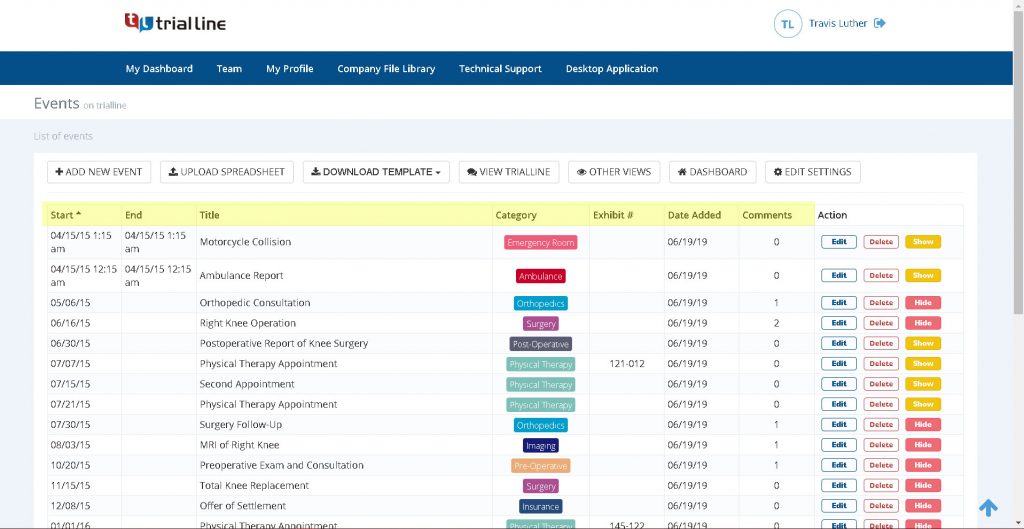With the evolving process and work environments, technological tools are becoming increasingly prevalent. Like other core industries, the legal field is adapting to the increasing digital transformation. More lawyers are embracing tools to simplify processes such as research and billing.
Driven by the growing demand for work-from-home setups and automation, lawyers and law firms will have to adapt to these changes with the right tech tools.
In this blog, we’ll discuss the best tools for lawyers, drawing from industry reports and trends observed in the legal profession. This way, you can make informed decisions on what your firm can adopt to enhance its efficiency.
What Are Tech Tools for Lawyers?
Technology is transforming the legal profession, allowing law firms to manage legal practice more efficiently. Outdated methods create delays, security risks, and disorganization. Modern legal software helps streamline law firm operations, improve task management, and enhance client intake and communication.
Key tools include case management software for organizing cases, legal research tools for accessing case law, and document automation for handling legal documents. Project management software helps coordinate tasks, while AI-powered tools assist with contract analysis and document review. Time tracking and accounting software support billing accuracy and financial oversight.
Using the best tools for lawyers makes legal work more efficient, improves legal services, and strengthens case preparation. As the legal practice continues evolving, adopting AI-powered tools and practice management software is key to staying competitive.
Recommended Reading
How Legal Timeline Tools Help Your Case
Best Lawyer Tech Tools
Law firms use technology to improve efficiency, security, and client service. The right legal software helps manage legal documents, track billable hours, and communicate effectively with clients. Below are the best tools for lawyers that support different aspects of legal practice, from case management to legal research and document automation.
Legal Timeline Software
Organizing case details in a clear timeline improves case preparation and legal strategy. Legal timeline software helps lawyers visualize key case events, track evidence, and prepare for court.
For instance, TrialLine is a legal timeline tool that organizes legal documents and evidence chronologically. It helps with case preparation for court appearances, mediation, and negotiations.
AI Tools for Lawyers
AI-powered solutions are revolutionizing legal work by automating tasks such as research, document review, and contract analysis.
In particular, AI-powered legal assistants help analyze case law and predict case outcomes. They can help with contract analysis, automate document review, and identify legal risks.
Cloud Storage for Legal Documents
Lawyers need secure document management software to store and access files from any location. Cloud storage enhances data security and allows law firms to work remotely.
DropSend is an example of a secure cloud storage solution with encryption to protect client data. You can use it to set expiration dates, control downloads, and apply password protection for sensitive files.
Legal Research Tools
Fast and accurate research is essential in the legal industry. Modern platforms provide access to vast legal databases, statutes, and precedents.
Platforms like Westlaw and LexisNexis provide access to comprehensive legal databases, including case law, statutes, and legal journals.
Document Management and Automation

Paperwork is an integral part of the law, but handling documents doesn’t have to be as tedious or time-consuming as it once was. Legal document automation tools simplify document creation by using existing information, such as key dates or contact details, to populate forms.
iManage and Clio are among the top-rated tools for document management for legal professionals.
E-Discovery Tools
Today, the majority of discoveries are electronic or e-discoveries. E-discovery tools are specialized software solutions designed to help legal professionals identify, collect, review, and produce electronically stored information (ESI) during the discovery phase of litigation.
Key functions of e-discovery tools include data collection, processing, review, production, and preservation. A few examples of e-discovery tools are Relativity, Everlaw, and Logikcull.
Time Tracking and Billing Software
Accurate time tracking and billing are crucial for law firm profitability. However, manually monitoring time and handling billing can reduce productivity.
Billing and time-tracking tools help legal professionals accurately record the time spent on various tasks and generate invoices for clients. These tools improve practice management so that lawyers are properly compensated for their work.
You can use these tools to track billable hours for specific tasks or cases and create detailed invoices based on recorded time entries. Additionally, they record costs incurred during a case, such as court fees, travel expenses, and other billable items.
Practice Management Software

Legal practice management software is essential for law firms, particularly solo practitioners.
This software is a comprehensive solution designed to help law firms manage their daily operations more efficiently. It integrates various functions to streamline tasks and increase productivity. Some practice management software for lawyers include Clio, MyCase, and Practice Panther.
Virtual Meeting Tools
Communication and collaboration are pivotal for a lawyer’s achievements, yet face-to-face interactions aren’t always feasible or preferred. Lawyers often find themselves needing to collaborate with colleagues, clients, and experts situated in diverse geographical areas.
Virtual meeting tools facilitate smooth communication and collaboration. Furthermore, virtual meetings enable law firms to uphold client relationships, even in the absence of in-person meetings.
Legal Analytics Tools
Legal analytics tools are software solutions that use data analysis techniques to offer insights and predictions across different facets of the legal field. These tools forecast the probable outcome of legal cases by considering various factors. They also pinpoint pertinent case laws, statutes, and legal articles relevant to specific legal matters.
Client Portals
Client portals allow lawyers to exchange messages and documents with clients securely. They grant clients access to information so they stay informed about their cases with minimal manual updates from lawyers.
You can communicate and share sensitive information, including legal documents, without the threat of interception or unauthorized access. Clients can log in to the portal conveniently from any location with internet access. In turn, they can review case updates, exchange documents, and communicate with you even beyond regular business hours.
Selecting appropriate tools can significantly impact the growth of your law firm. Embracing legal tech tools and innovations can enhance efficiency, profitability, and client focus.
Despite the abundance of available tools, it is not necessary to adopt them all simultaneously. Instead, carefully evaluate each tool and begin with the essentials. Gradually integrate additional tools strategically to establish a tech stack that optimizes firm operations.
Top Legal Timeline Software for Lawyers to Use in 2025
Legal timeline software is one of the best tools for lawyers, offering a clear, visual sequence of events that enhances case preparation, improves client communications, and strengthens legal strategies.
More than just date tracking, legal timeline software integrates with case management software, supports document automation, and helps attorneys analyze case facts with precision. It ensures that law firms can organize evidence efficiently, present cases effectively in court, and manage law firm operations with greater accuracy.
Below are the top legal timeline software solutions for 2025, designed to help lawyers, litigators, and legal professionals build stronger cases.
1. TrialLine
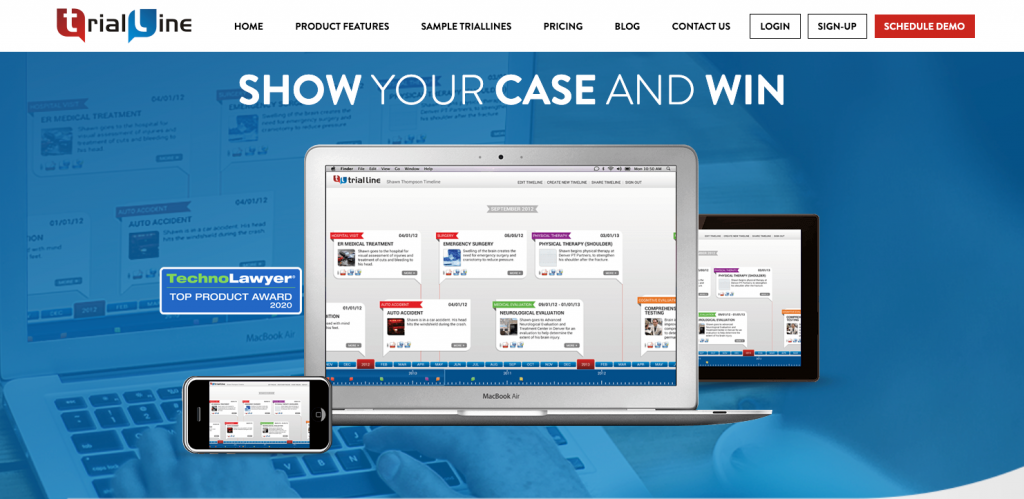
TrialLine is cloud-based legal timeline software built specifically for law firms that require a structured way to organize case facts, evidence, and witness testimony. Unlike generic timeline tools, TrialLine is designed for litigation-focused legal professionals, providing interactive visual timelines that connect case details in a way that’s easy to present in court.
Most timeline tools offer basic event plotting, but TrialLine integrates deeper case management features that help attorneys prepare for court appearances, depositions, and mediations. It allows lawyers to attach legal documents, videos, photos, and court filings directly to specific timeline entries, ensuring that all case-related data remains well-organized and easy to access.
Key Features of TrialLine:
- Chronological case organization – TrialLine structures legal cases into a clear timeline format, making it easier to identify patterns and build legal arguments.
- Document and evidence management – Attach case files, PDFs, photos, and videos directly to timeline entries for efficient document management.
- Advanced filtering and categorization – Sort and filter timeline events by issue type, witness, or relevance, allowing attorneys to focus on specific case details.
- Interactive courtroom presentations – Unlike static timelines, TrialLine allows users to click through case events in real time, providing a dynamic and engaging trial presentation.
- Team collaboration & sharing – Share case timelines with legal teams, clients, and experts to keep everyone aligned.
- Cloud-based access – Securely log in from any device, making it ideal for remote legal teams and multi-state litigation.
Pricing Plans:
- Month-to-month plan – $59 per month per user, Flexible subscription with no long-term commitment, full access to the online version, and 100GB cloud storage for legal documents.
- Annual plan – $41 per month per user (billed annually at $499, saving $209 per year). Best value plan offering full TrialLine features at a discounted rate, including document automation, timeline visualization, and case collaboration tools.
2. CaseFleet
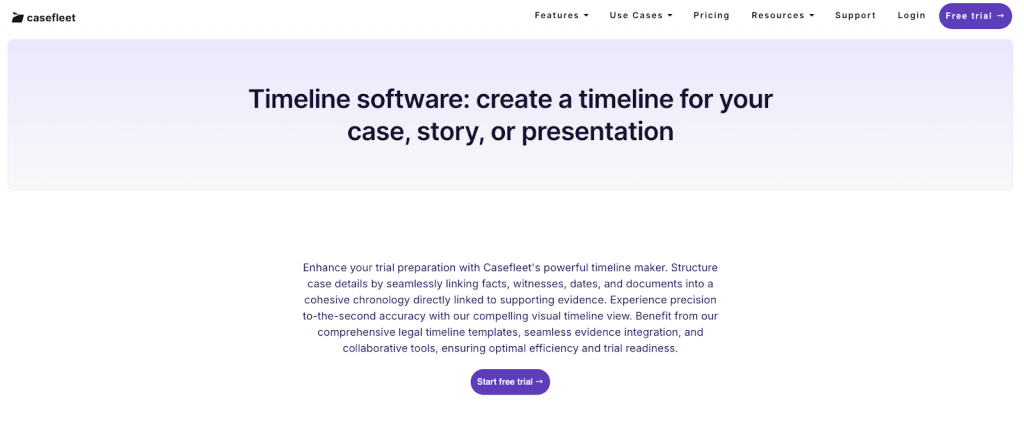
Source: CaseFleet.com
CaseFleet is cloud-based legal case management software for organizing case facts and managing documents. It lets you create detailed case chronologies by linking facts, witnesses, dates, and evidence in a cohesive timeline.
The platform’s document reviewer feature allows for the attachment of supporting materials directly to specific facts for easier evidence management. Users can search and filter facts by various criteria, such as date, contact, issue, or source, and can edit information inline for accuracy.
Key Features:
- Fact and issue management – Organize case details by linking facts, issues, witnesses, and evidence into a cohesive timeline.
- Document review – Attach and review supporting materials directly within the platform, streamlining evidence management.
- Full-text search – Search within complex legal documents to locate relevant information.
- Task management – Assign and track tasks to ensure timely completion of case-related activities.
Pricing:
- Starter – $40/user/month with chronology-building tools and evidence citations
- Standard – $100/user/month with full-text search and deposition designations
- Enterprise – Custom pricing
3. TimeMap
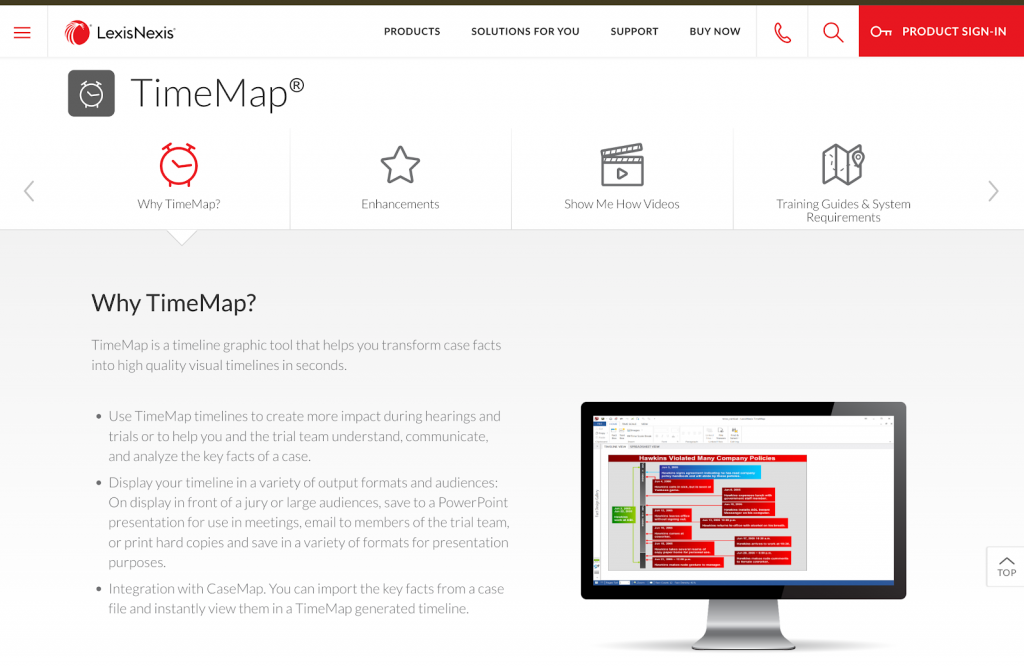
Source: Lexisnexis.com
TimeMap is a timeline graphic tool developed by LexisNexis for converting case facts into high-quality visual timelines for court proceedings. The platform offers over 30 pre-built templates, customizable elements, and integration with other LexisNexis products like CaseMap.
Key Features:
- Fact boxes – Create flags denoting events in the case chronology, automatically positioned on the timeline based on their dates.
- Multiple output formats – Display timelines in various formats, including PowerPoint presentations, printed copies, or digital images (JPEG, GIF, BMP, or metafile) for diverse presentation requirements.
- Full-screen mode: Present timelines directly from TimeMap in full-screen mode, facilitating effective display during meetings or court proceedings.
Pricing Plans:
- Pricing for CaseMap is not publicly available on LexisNexis.
4. SmartDraw
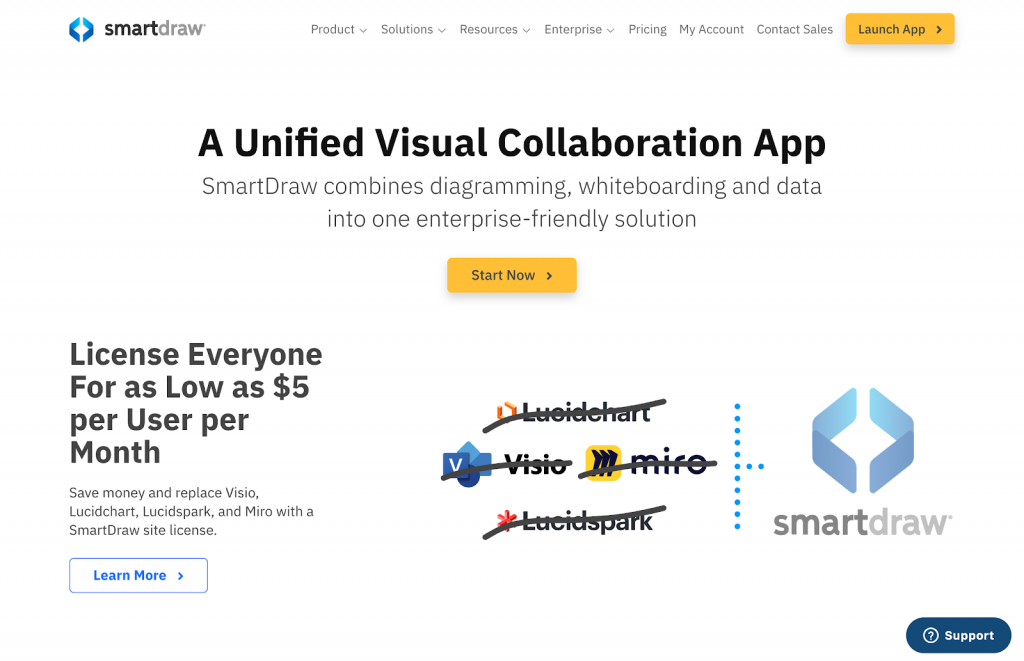
Source: Smartdraw.com
SmartDraw is not exclusively a legal timeline tool, but many law firms use it to create basic case timelines for court presentations and legal arguments. It’s more of a general-purpose timeline and diagram tool, making it a budget-friendly alternative for firms that don’t need advanced case management capabilities.
Key Features:
- Drag-and-drop timeline builder – Create legal timelines with minimal effort.
- Integration with Microsoft Office and Google Drive – Export files into Word, PowerPoint, and other formats.
- Basic collaboration tools – Share timelines with colleagues and clients.
Pricing Plans:
- Individual plan: $9.95 per month.
- Team plan: $8.25 per user per month (minimum of three users). Comes with document retention and control
- Site plan: $5 per user per month. With Everything in the Team plan, plus multiple shared folders
Support Your Casework With Legal Timeline Software

Among the best tools for lawyers, legal timeline software plays a key role in case preparation, trial presentations, and legal strategy development. TrialLine is a powerful solution that helps law firms create detailed legal timelines, making sure key case events and supporting legal documents are organized in a clear, chronological format.
With TrialLine, attorneys can attach documents, photos, and videos to case events, collaborate with legal teams, and present timelines in a way that is easy to understand for juries, judges, and opposing counsel. This cloud-based software simplifies complex cases, making it an invaluable tool for litigation.
Start improving case organization and legal presentations today. Sign up for a 14-day free trial of TrialLine and schedule a demo with an expert to see how it can transform your law firm’s operations!
FAQs About Best Tools for Lawyers
How can a lawyer make $500,000 a year?
Lawyers can reach $500,000 per year by specializing in high-paying legal fields like corporate law, intellectual property, or medical malpractice. A strong client base, effective billing strategies, and leveraging AI-powered tools for efficiency help increase earnings. Running a well-organized law firm with the right legal software also improves profitability.
What are some tools lawyers use?
Lawyers use case management software like Clio or MyCase to track cases, legal research tools like Westlaw and LexisNexis, and document automation software like HotDocs to reduce paperwork. Time tracking and billing tools such as TimeSolv help lawyers track billable hours, while legal timeline software like TrialLine organizes case events and evidence.
What are the best organization tools for lawyers?
The best tools for law firm organizations include TrialLine for structuring case timelines, Clio for managing legal documents and billing, and iManage for secure document storage. Microsoft OneNote and Notion are great for organizing notes and legal research. These tools help lawyers stay organized, reduce errors, and improve efficiency.
Which AI tool is best for lawyers?
AI is improving legal work by automating research and document review. Casetext CoCounsel is an AI-powered legal research assistant, LawGeex automates contract analysis, and ChatGPT for Lawyers helps with legal writing, summarization, and contract drafting. These tools save time and allow lawyers to focus on complex legal strategies.
Why should law firms use legal timeline software?
Legal timeline software like TrialLine helps lawyers organize case facts, attach legal documents, and present cases. It allows attorneys to structure case timelines, making complex cases easier to explain to judges, juries, and clients. TrialLine improves case preparation and ensures all key events and evidence are easy to access.




